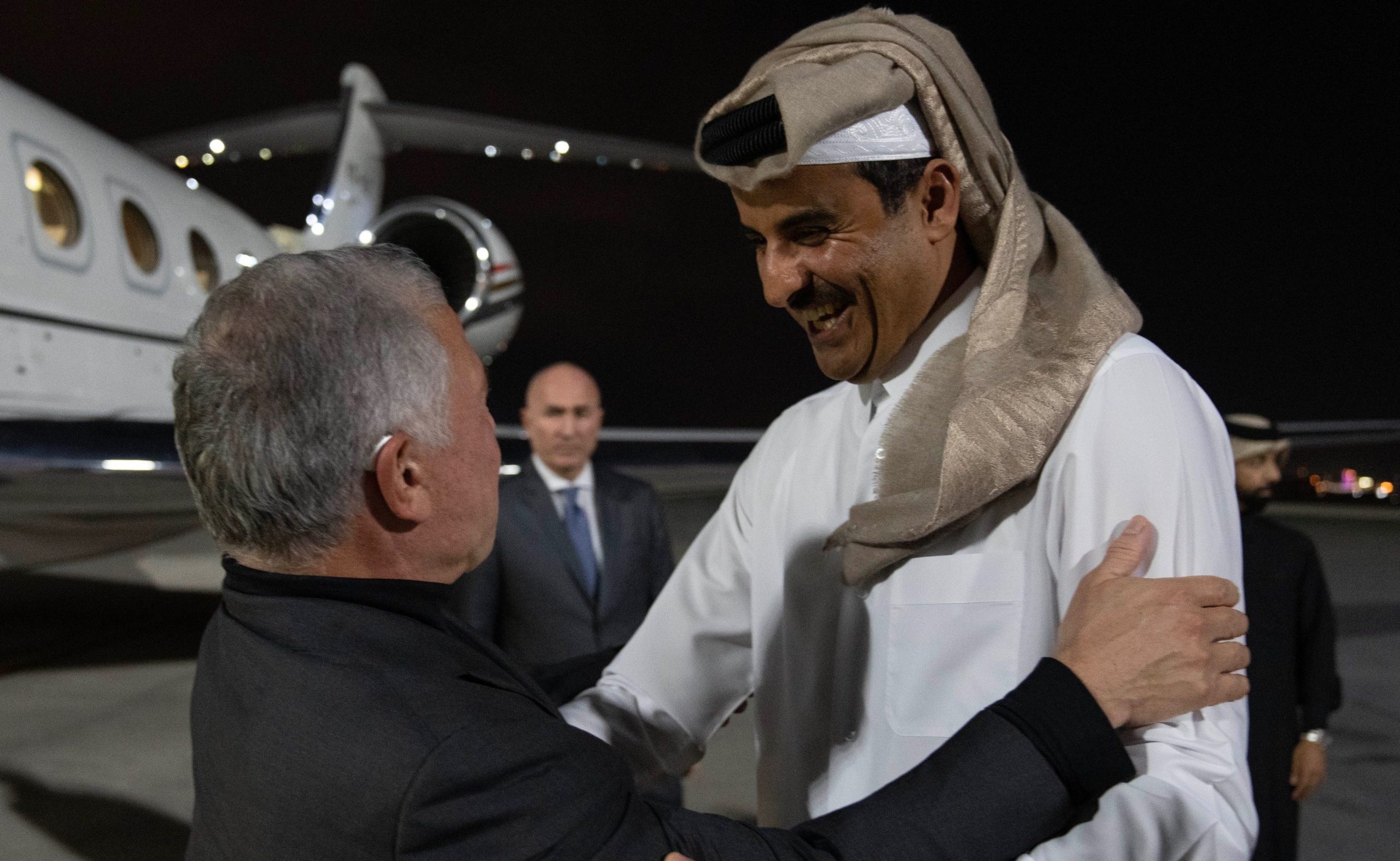Last year was described as the deadliest year for Palestinians in at least a decade, with more than 150 Palestinians killed.
Qatar’s Amir Sheikh Tamim bin Hamad Al Thani met with Jordan’s King Abdullah II in Doha on Wednesday, where both leaders discussed bilateral ties and developments in Palestine.
In a statement, the Amiri Diwan said that the leaders discussed “means of promoting the fraternal bonds” and developing Doha and Amman’s bilateral ties.
The Jordanian king was previously in Doha in November for the opening of the 2022 FIFA World Cup, which saw the attendance of other world leaders from the region and beyond.
King Abdullah paid another bilateral visit in 2021, his first in years, which saw the signing of new memoranda between Doha and Amman.
“They also discussed the most prominent regional and international developments of common concern, in addition to aspects of achieving stability, security and development in the region,” the Amiri Diwan added.
Jordan’s Royal Hashemite Court said Sheikh Tamim and King Abdullah discussed the Palestinian cause while “stressing the importance of stopping all illegal Israeli measures that undermine this solution.”
Concerns over escalations in Jerusalem
King Abdullah will be heading to the United States and Canada following his trip to Qatar, where analysts say talks on ongoing Israeli aggression is likely to be on his agenda.
His trip to Doha comes just a day after the Jordanian leader met with Israeli Prime Minister Benjamin Netanyahu in Amman amid rising escalations in Jerusalem.
Speaking to Doha News, regional analysts believe the timing of the meeting with Netanyahu and the Doha visit suggest a possible discussion with the Qatari leader over the Hashemite custodianship of holy sites in Jerusalem.
“Qatar has the capabilities to help politically, talk to the Americans, the Europeans to convince the Israelis that the more the situation deteriorates in Jerusalem, it will not serve anyone, it will cause more instability in the region,” the Middle East analyst said.
According to the Jordanian Royal Court, the Hashemite kingdom’s leader “stressed the importance of respecting the historical and legal status quo in Al Aqsa Mosque/Al Haram Al Sharif.”
King Abdullah called for an end to escalatory measures in Jerusalem while reiterating Amman’s “steadfast position in support of the two-state solution”.
In a separate statement, Netanyahu made no mention of Israel’s measures against Palestinians, stating that the meeting touched on cooperation between Amman and Tel Aviv.
“Jordan is very worried about what Israel is doing when it comes to the situation in Jerusalem and the impact of changing the status of the holy lands, especially that status which lasted since 1948 onwards,” the analyst said.
Israeli settlers, protected by the occupation forces, frequently storm the holy sites in Jerusalem in an attempt to change its status quo.
Earlier this month, Israeli Minister of National Security’s Itamar Ben-Gvir stormed the Al-Aqsa Mosque in a move widely slammed as “provocative” by Palestinians.
Jordan has been the custodian of Muslim and Christian holy places in Jerusalem since 1924 under what is widely known as the “Hashemite Custodianship”.
Speaking to CNN last year, King Abdullah said the custodianship of the holy sites is a “red line”.
“We have certain red lines. And if people want to push those red lines then we will deal with that. But I have to believe that there is a lot of people in Israel that are concerned as much as we are,” King Abdullah told CNN.
The Hashemite Kingdom was the second in the Arab world to establish ties with Israel in 1994, after Egypt in 1979.
Jordan and Israel had signed the Wadi Araba Peace Treaty, named after the southern border crossing, guaranteeing the former the restoration of its occupied areas of Al-Baqoura and Al-Ghumar.
With Israeli aggression intensifying since last year, analysts also noted that King Abdullah would seek to bring back discussions over a two-state solution, a stance agreed upon globally.
Since the start of the year, Israel occupation forces (IOF) killed at least 14 Palestinians including minors, with continuous raids being carried out in occupied land.
Last year was also described as the deadliest year for Palestinians in at least a decade, with more than 150 Palestinians killed, per figures gathered by the United Nations.







